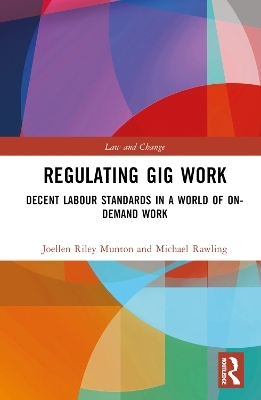
Regulating Gig Work
Routledge (Verlag)
978-1-032-25144-8 (ISBN)
Digital revolution demands new approaches to regulating work. The ‘Uberisation’ of work is not, in reality, a new phenomenon. It reintroduces the practices of ‘on-demand’ engagement of labour, common prior to the development of continuing employment. What is new, however, is the capacity of digital technology to engage labour in ways that avoid characterisation as employment according to the legal tests developed in the 20th century.
This book tackles the challenge of ensuring that the emerging tribes of ‘gig’ workers in labour markets across the globe are afforded decent standards of work. This book discusses how to provide decent conditions and safe working standards for on-demand workers engaged through digital platforms. It interrogates the rise of gig work, and the legal strategies that might be engaged to deal with the risk that on-demand work will fall and remain outside of employment protections. It draws on observations of practices across the globe but focusses particularly on regulatory solutions developed in Australia.
The book will be a useful reference to policy making and legal reforms to address vulnerabilities of gig workers.
Michael Rawling, University of Technology Sydney, Faculty of Law. Joellen Riley Munton, University of Technology Sydney, Faculty of Law, and Professor Emerita, The University of Sydney.
Preface viii
1 Context and history 1
Introduction 1
Common features of platform-mediated work 3
Labour law avoidance 4
‘Employment’ 5
Algorithmic control 8
‘Multi-apping’ 10
Regulating for safe, fair, and dignified work 12
2 A global perspective 16
Introduction 16
Could development of further ILO standards promote gig worker rights? 17
OECD 20
The centrality of domestic regulation 20
Europe 21
European Union 21
Employment status under the proposed EU Directive 21
Regulation of algorithmic management 23
Dispute resolution and enforcement 23
Individual European countries 24
United Kingdom 25
United States 26
New Zealand 27
Conclusion 28
3 Overview of workers’ essential needs and forms of legal protection 29
Introduction 29
‘Deeming’ provisions 32
‘Third way’ statutory definitions 35
Special regulatory schemes for contractors 38
New South Wales industrial laws 39
Operation of the Chapter 6 regime 40
Victorian owner driver scheme 41
Western Australian owner driver scheme 42
Queensland 43
Road Safety Remuneration Tribunal 45
Franchising code of conduct 46
Unfair contracts review 49
Conclusion 50
4 Pay and safety 51
Introduction 51
Why substantive labour standards should apply to gig workers 52
Gig workers’ experience of low pay and poor safety 53
Pay and safety link evident in gig work 56
The current regulation and its shortcomings 57
WHS laws 57
Workers’ compensation 58
The appropriate methods of producing a socially beneficial remuneration standard 60
Proposed Reforms 62
Conclusion 64
5 Procedural rights: Freedom of association and job security standards 65
Introduction 65
The function and benefits of collective bargaining 66
Why gig workers deserve collective bargaining rights 67
Establishing collective bargaining for gig workers – possibilities and obstacles 67
Realising substantive collective bargaining rights for gig workers 70
Protection of job security 70
Dispute resolution 73
Conclusion 76
6 Exclusion from jurisdiction as a regulatory strategy 78
Introduction 78
Rideshare as a ‘disruptor’ 78
Bans across the globe 79
United States 80
Europe 80
United Kingdom 81
Scandinavia 82
India 82
Other countries 82
Bans in historical context: Previous restrictions on the free flow of capital 82
Digital labour platform responses to bans 84
The cloud of words 84
Enter markets and keep operating: Business as usual despite bans 85
Using violence against rideshare drivers to gain support 86
The emergency ‘kill’ switch 86
Big spending on lobbying 87
Overall effectiveness of the bans 87
‘Regulatory entrepreneurship’ business model and bans 90
Beyond law – compliance measures to combat disruption and improve bans policy 91
Conclusion 92
7 Organisational forms to enhance worker control and ownership 94
Democracy at work for platform workers 94
Worker participation in corporations 96
Cooperative enterprises 97
RideAustin – the not-for-profit 97
ATX – taxi driver cooperative 99
Governance of cooperatives 99
Worker ownership trusts 101
Conclusion 102
8 Concluding thoughts 104
Regulating on-demand work, everywhere 104
Beyond ‘employment’ 105
Future-proofing labour regulation 106
Supervision 107
Bibliography 109
Index 121
| Erscheinungsdatum | 14.12.2023 |
|---|---|
| Reihe/Serie | Law and Change |
| Verlagsort | London |
| Sprache | englisch |
| Maße | 156 x 234 mm |
| Gewicht | 840 g |
| Themenwelt | Recht / Steuern ► Allgemeines / Lexika |
| Recht / Steuern ► Arbeits- / Sozialrecht ► Arbeitsrecht | |
| Recht / Steuern ► EU / Internationales Recht | |
| Wirtschaft ► Betriebswirtschaft / Management ► Personalwesen | |
| Wirtschaft ► Volkswirtschaftslehre ► Makroökonomie | |
| ISBN-10 | 1-032-25144-1 / 1032251441 |
| ISBN-13 | 978-1-032-25144-8 / 9781032251448 |
| Zustand | Neuware |
| Informationen gemäß Produktsicherheitsverordnung (GPSR) | |
| Haben Sie eine Frage zum Produkt? |
aus dem Bereich


